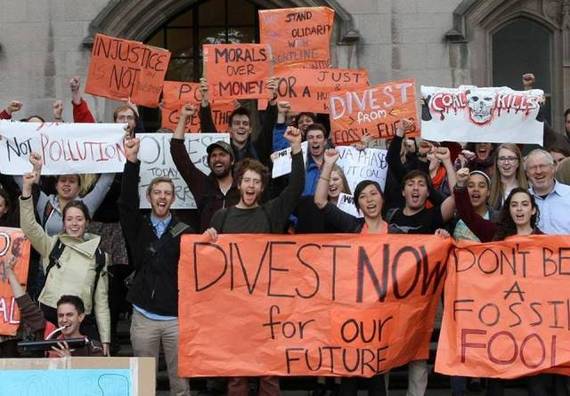Fossil fuel divestment news filled my newsfeed over the past week, adding to a growing list of impressive divestment stories from the past year. Again and again, we see young people convincing their colleges to divest, activists convincing banks to divest, and shareholders convincing companies to divest.
Financial dominoes just keep falling for the coal industry, which makes divesting from coal not just a smart move for the climate, but a prudent investment decision as well. SNL Energy just reported that the market value of publicly traded coal companies fell by 50 percent in less than a year. As Politico's Mike Grunwald summed it up in a tweet:
If you listened to the eco-freaks and divested from coal a year ago, you avoided losing half your money. https://t.co/TheGkD1PHV
— Michael Grunwald (@MikeGrunwald) June 10, 2015
Here is some of the latest:
-- On June 9, Norway announced that its massive $890 billion sovereign wealth fund will divest from the coal industry. (The New York Times then rightly pointed out that the country should divest from oil and gas as well). Norway's decision is particularly big news because they plan to divest not just from mining companies, but also from coal-heavy utilities that burn it. Based on an Urgewald review of Norway's criteria, this divestment is likely to hit a number of U.S. utility giants including American Electric Power, Dominion Resources, Duke Energy, Xcel Energy, NRG Energy, and Southern Company.
--- In early June, the California Senate passed a bill requiring the state's massive pension funds, the $304 billion California Public Employees' Retirement System and $193 billion California State Teachers' Retirement System, to divest from coal.
-- Georgetown University announced on June 4 that it will divest from "companies whose principal business is mining coal for use in energy production."
-- The University of Hawaii announces on May 22 that it will "divest its $66 million endowment from fossil fuels" after a campaign by students, faculty, and community members, making it the largest institution to divest from fossil fuels.
-- On May 14, the University of Washington announced it will divest from coal companies after more than 20 student organizations petitioned the school's president.
-- In early May, Bank of America announced it will no longer finance coal companies. Amanda Starbuck with Rainforest Action Network, which has been targeting the bank for years, said the policy represents a "sea change" for the bank.
-- Also in early May, ING said it will stop financing the biggest companies active in mountaintop-removal coal mining.
-- Earlier this spring, after an amazingly dedicated campaign led by the Earth Quaker Action Team, PNC bank announced it will no longer fund mountaintop-removal coal mining.
The divestment movement is powerful, and it means business. These unrelenting financial headwinds for coal underscore the urgent need for our nation to put resources and political leadership behind an economic transition plan to assist with the move from coal to clean energy, especially for Appalachia.
This movement represents thousands and thousands of people who see the harm that fossil fuels are doing to communities and our kids' future. It is taking billions of dollars out of the hands of industries who continue to meddle in politics in order to fight climate action and clean air and clean water protections. And it's just getting started.
Photo courtesy of Divest University of Washington.

